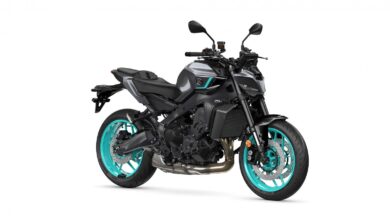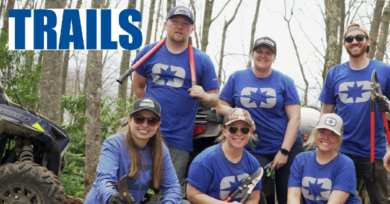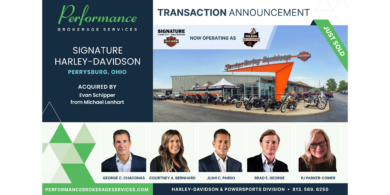Corbins fight theft claims
Mike Corbin and his son Tom finally have decided to respond to charges in their hometown newspaper and in a lawsuit filed by the state of California regarding the failure of their company, Corbin-Motors.
After months of silence, the Corbins have demanded a retraction of “numerous defamatory and erroneous statements that have appeared in the Pinnacle (newspaper)” regarding their activities in the development and operation of Corbin-Motors, a company set up to manufacture three-wheel, single-passenger vehicles. The first products were the Sparrow, the Sparrow II and the Merlin, a gas-powered sportscar.
The Corbins argue that the Pinnacle reports were the cause of investigations by California officials that resulted in a lawsuit against the Corbins in May 2003.
In an interview with Powersports Business, Tom and Mike Corbin and their attorney, Dave Baskin, addressed the key points about Corbin-Motors and about the status of Corbin-Pacific, the well-established motorcycle accessories company. Both companies are based in Hollister, Calif.
Corbin-Pacific is profitable
Mike Corbin said his accessories company has rebounded this year after losing money in 2002, and he expects the company to post a profit on a sales increase of 19%-21% for the fiscal year ending Sept. 30, 2003. The company has earned a profit over the last seven months, he added. This growth comes on top of an 11% sales increase last year, Corbin said.
Corbin-Pacific has added about 20 employees to handle the increased work load this year, Corbin said, bringing the total employee count to about 220.
Corbin-Pacific has “extremely good cash flow,” Corbin said of the closely-held company, adding that the company has a solid foundation after 35 years, is pumping out new products to meet market needs and is shipping record levels of products to distributors.
“We’re turning cash flow into growth,” says Corbin. “We’re just focusing on our core values; we’re inventing new (products) and bringing them into production. We’re the market leader in our field. If you look at Corbin, for decades we’ve been able to adapt to changing markets and bring new products on line. I’m committed to doing that for at least 15 more years.”
While aftermarket market share figures are difficult to come by, Corbin says C-P has approximately 80% of the markets in which it competes and it hasn’t lost any share during the Sparrow battles. Corbin says he’s had discussions with suppliers — especially ones who have seen the Pinnacle stories — but he hasn’t lost any of them and his distribution network remains intact. He hasn’t had to change any financial terms for either suppliers or distributors, he said.
building a better bird
Mike Corbin, if nothing else, is a hugely creative man who holds a fistful of patents for everything from motorcycle accessories to his many specialty vehicles.
A master electrician who learned his skills in the U.S. Navy, Corbin set about to build an energy-efficient electric car in the mid-1990s. The result was the three-wheeled, egg-shaped Sparrow that was classified by the federal government as a motorcycle. That meant it could be ridden in restricted highway lanes and parked in spots set aside for motorcycles.
The international response was tremendous because the Sparrow was cute and seemed to fill an economic and social void. And it seemed to some to be a hot investment, too. “It was during the dot.com era,” recalls Corbin, somewhat wistfully. “We’d have Silicon Valley guys coming here to buy a (motorcycle) seat and wanting to buy $10,000 worth of (Corbin-Motors) stock.” Eventually, Tom Corbin and others raised approximately $10 million in private securities placements.
Unfortunately, shifting from R&D to full scale production of the Sparrow was not without difficulties, and many machines were returned to the factory by customers and dealers for repairs. Sales slumped, cash flow dribbled off and investors turned conservative in the wake of the dot.com bust, 9/11, and the economic downturn.
The Corbins’ problems were compounded with the purchase in 1999 of MCM Engine Technology, a Costa Mesa, Calif., developer of an engine Mike wanted to drop into the Merlin. One member of the MCM team, Ron Huch, eventually was named president of Corbin Motors.
Partnering up with MCM was “our fatal mistake,” says Mike Corbin. “We thought Ron Hutch was the missing link that would get us to an IPO; we were still cash poor, but there was exuberance everywhere.”
Corbin-Motors filed bankruptcy earlier this year after Huch won a judgement against the company for approximately $600,000. “He took everything,” says Mike Corbin. “The company had no way to get to Chapter 11. We didn’t even have a ballpoint pen.”
clearing the air
In the ensuing months, the Corbins were accused of misappropriating assets of the car company, defrauding investors, illegally selling franchises, and other assorted misdeeds. The battle escalated in May when the State of California filed its complaint against the Corbins, saying they misled investors, consumers and dealers. The Corbins say they did nothing wrong and were largely victims of circumstances; they attempted to build a new company that simply ran out of cash. They also say that executives of the Pinnacle are disgruntled investors.
They didn’t sell nonexempt franchises, say the Corbins; they were selling dealerships, the same as a motorcycle or auto dealership. The state is wrong in saying their offerings are regulated by franchise laws.
And they didn’t sell to unqualified investors, people who couldn’t afford to lose their investment, they say. Each of the investors completed a “suitability” questionnaire attesting to their ability to participate in the investment. Risks were fully disclosed in the Corbin-Motors business plan and offering materials, they say.
And they don’t have $6.8 million stashed in a Florida company, as some have alleged, they argue. The family-owned company holds 6.8 million shares of worthless Corbin-Motors stock, according to the Corbins.
The Corbins lost money like everyone else, they say; more, probably, to the tune of $3.4 million. And that doesn’t include all of the money lost by Corbin-Pacific during the development of the Sparrows and the Merlins.
“I and Corbin-Pacific have done nothing wrong,” maintains Mike Corbin. If things would have been different, he says, the Merlin would be in production now. “And we would be selling all we could make.”
There are no trial dates set and the Pinnacle has said that it stands by its coverage. Mike Corbin continues to hold all of the intellectual property for the Sparrow II and the Merlin.




